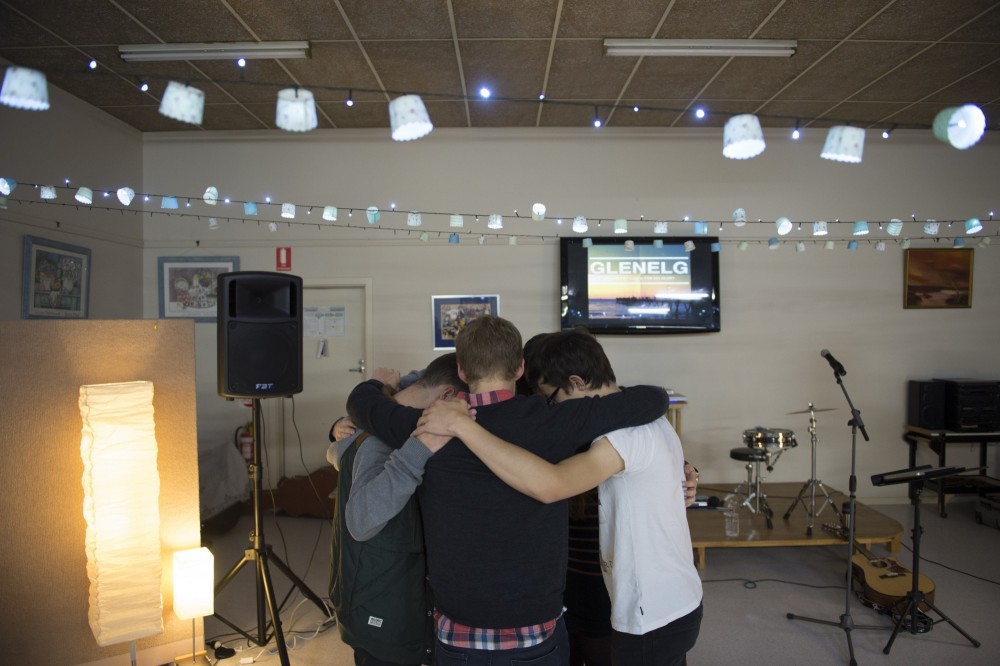
Sending Churches
To Send Missionaries is to Pray
February 25, 2016
by Zach Bradley

This post is the second in a three-part series exploring the role of the sending church in missions. Read Part I or Part III.
The following is an excerpt from The Sending Church Defined, written by Upstream Collective. It can be purchased in print.
While at a secret meeting with house church leaders in an intensely persecuted region of China, missiologist Nik Ripken was asked a peculiar question: “Are the believers [in other countries] persecuted like we are?”
Ripken answered yes, describing the kind of persecution taking place in two Middle Eastern countries. The group became eerily silent.
Early the next morning Ripken was jarred awake to shouts and screams. It wasn’t secret police, but the Chinese Christians praying in anguish for their Middle Eastern brothers and sisters. Ripken comments, “In that instant, I could see why the number of Chinese believers had gone from a few hundred thousand to perhaps hundreds of millions!”[footnote]Nik Ripken and Gregg Lewis, The Insanity of God: A True Story of Faith Resurrected (Nashville, TN: B&H Books, 2013), 243-244.[/footnote]
Prayer Moves Missions
Prayer is the church’s fuel for mission. E.M. Bounds said that without prayer “the church is lifeless and powerless.'[footnote]E. M. Bounds, The Complete Works of E. M. Bounds on Prayer (Grand Rapids, MI: Baker, 1990), 75.[/footnote] Yet it’s not a stretch to say that when she does pray, the earth shakes—just look at the examples strewn throughout the book of Acts! The first church devoted themselves to prayer, which was followed by awe upon everyone, many wonders and signs, having all things in common, and the daily addition of new believers (2:42-47).
Later, in response to persecution, the church prayed together for boldness, which led to a mini earthquake, the filling of the Holy Spirit, and continued daring witness (4:23-31). The leaders of the church at Antioch fasted and prayed together, and the Holy Spirit told them to send out Barnabas and Saul, sparking a massive gospel movement (13:1-3). As Donald Whitney puts it, “united prayer is always linked with the effectiveness of the gospel and the church.“[footnote]Donald S. Whitney, Spiritual Disciplines Within the Church: Participating Fully in the Body of Christ (Chicago, IL: Moody, 1996), 167.[/footnote]
The Sending Church Moves in Prayer
Sending churches recognize that the neighborhoods and the nations are theirs for the asking.[footnote]Jason Mandryk, Operation World: The Definitive Prayer Guide to Every Nation (Downers Grove, IL: IVP Books, 2010), xxii.[/footnote] This is because the neighborhoods and nations belong to the one who has all authority in heaven and on earth (Matthew 28:18), who rules over them with a rod of iron (Psalm 2:9), and who is obliged to share the throne with his own people (2 Timothy 2:12). Prayer is “a wartime walkie-talkie for the mission of the church”.[footnote]John Piper, Let the Nations Be Glad: The Supremacy of God in Missions (Grand Rapids, Baker Academic, 2010), 45.[/footnote] As the church battles on the front lines against the powers of darkness and unbelief, she is maneuvered, provisioned, and made victorious by God through prayer.
Thankfully, Jesus knows well our busy ambitions, and he is fit to remind us constantly of our need. He remarks in Luke 10:2 that the “harvest is plentiful, but the laborers are few.” There, seventy-two eager young disciples are lining up like a fifth grade 100-yard dash, ready to impress the Messiah with their skills. Yet notice that Jesus’ first command isn’t go. Instead he says pray—
“Pray earnestly to the Lord of the harvest to send out laborers into his harvest.”
The implication wasn’t that praying was more pious than going, but that they needed Jesus every step of the way. He would later warn them, “When you have done all that you were commanded, say, ‘We are unworthy servants; we have only done what was our duty,’” (17:10). The call to be prayerful is not an obligation to rote activity as though we’re spinning Buddhist prayer wheels, but a call to know Christ. Said Dallas Willard, “An obsession merely with doing what God commands may be the very thing that rules out being the kind of person that he calls us to be.”[footnote]Dallas Willard, Hearing God: Developing a Conversational Relationship with God (Downers Grove, IL: IVP Books, 1999) 12.[/footnote]
Prayer Moves in Power
When viewed in light of who God is, the command to pray becomes both a powerful weapon and a warm invitation. In a sending church it is every person’s entry point into the mission. The old adage is true, every Christian can change the world through prayer. But what an individualistic perspective!
Medal of Honor recipients may turn battles, but armies win wars. The unified prayer of a church is a force few of us have ever witnessed outside the Scriptures. The church will rally to causes, campaigns, and cantatas, but just try to get everyone together to pray for an hour. Insert cricket sounds.
Mission leaders, especially pastors, can lead the way in shaping a culture of prayerfulness. D.A. Carson notes that Charles Spurgeon surprisingly was willing to share his pulpit, but not his “pastoral prayer,” which was intended to “not only intercede with God but also instruct and edify and encourage the saints.”[footnote]D. A. Carson, A Call to Spiritual Reformation: Priorities from Paul and His Prayers (Grand Rapids, MI: Baker Academic, 1992).[/footnote] Here the church will learn how to cry out for the neighborhoods and the nations rather than simply asking God to ‘bless the missionaries’.[footnote]Mike Barnett, ed., Discovering the Mission of God: Best Missional Practices for the 21st Century (Downers Grove, IL: IVP Academic, 2012), 372.[/footnote]
But prayer is not merely the entry point of missions in a sending church. It’s the foundation for every element of sending. What will be the church’s strategy? Who will lead in its formation? How will the church develop missionaries? Where will missionaries be sent? Who will the church partner with? What will ongoing support look like? Looks like we’ve got a lot to be praying about.
Related articles

